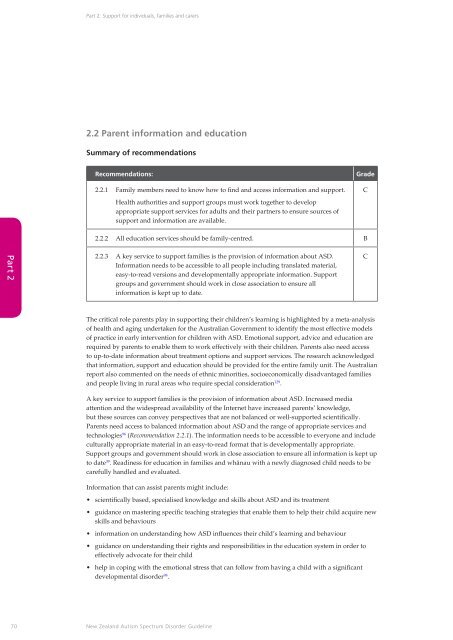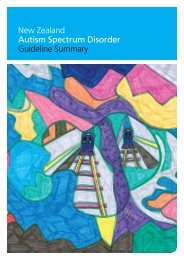New Zealand Autism Spectrum Disorder Guideline - Ministry of Health
New Zealand Autism Spectrum Disorder Guideline - Ministry of Health
New Zealand Autism Spectrum Disorder Guideline - Ministry of Health
You also want an ePaper? Increase the reach of your titles
YUMPU automatically turns print PDFs into web optimized ePapers that Google loves.
Part 2: Support for individuals, families and carers<br />
2.2 Parent information and education<br />
Summary <strong>of</strong> recommendations<br />
Recommendations:<br />
2.2.1 Family members need to know how to find and access information and support.<br />
<strong>Health</strong> authorities and support groups must work together to develop<br />
appropriate support services for adults and their partners to ensure sources <strong>of</strong><br />
support and information are available.<br />
Grade<br />
C<br />
2.2.2 All education services should be family-centred. B<br />
Part 2<br />
2.2.3 A key service to support families is the provision <strong>of</strong> information about ASD.<br />
Information needs to be accessible to all people including translated material,<br />
easy-to-read versions and developmentally appropriate information. Support<br />
groups and government should work in close association to ensure all<br />
information is kept up to date.<br />
C<br />
The critical role parents play in supporting their children’s learning is highlighted by a meta-analysis<br />
<strong>of</strong> health and aging undertaken for the Australian Government to identify the most effective models<br />
<strong>of</strong> practice in early intervention for children with ASD. Emotional support, advice and education are<br />
required by parents to enable them to work effectively with their children. Parents also need access<br />
to up-to-date information about treatment options and support services. The research acknowledged<br />
that information, support and education should be provided for the entire family unit. The Australian<br />
report also commented on the needs <strong>of</strong> ethnic minorities, socioeconomically disadvantaged families<br />
and people living in rural areas who require special consideration 129 .<br />
A key service to support families is the provision <strong>of</strong> information about ASD. Increased media<br />
attention and the widespread availability <strong>of</strong> the Internet have increased parents’ knowledge,<br />
but these sources can convey perspectives that are not balanced or well-supported scientifically.<br />
Parents need access to balanced information about ASD and the range <strong>of</strong> appropriate services and<br />
technologies 96 (Recommendation 2.2.1). The information needs to be accessible to everyone and include<br />
culturally appropriate material in an easy-to-read format that is developmentally appropriate.<br />
Support groups and government should work in close association to ensure all information is kept up<br />
to date 39 . Readiness for education in families and whänau with a newly diagnosed child needs to be<br />
carefully handled and evaluated.<br />
Information that can assist parents might include:<br />
• scientifically based, specialised knowledge and skills about ASD and its treatment<br />
• guidance on mastering specific teaching strategies that enable them to help their child acquire new<br />
skills and behaviours<br />
• information on understanding how ASD influences their child’s learning and behaviour<br />
• guidance on understanding their rights and responsibilities in the education system in order to<br />
effectively advocate for their child<br />
• help in coping with the emotional stress that can follow from having a child with a significant<br />
developmental disorder 98 .<br />
70<br />
<strong>New</strong> <strong>Zealand</strong> <strong>Autism</strong> <strong>Spectrum</strong> <strong>Disorder</strong> <strong>Guideline</strong>











